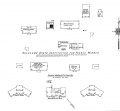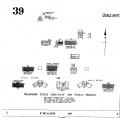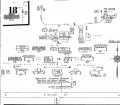Difference between revisions of "Oklahoma Institution for Feeble Minded"
(→Images) |
m |
||
| (3 intermediate revisions by 3 users not shown) | |||
| Line 9: | Line 9: | ||
| construction_ended = | | construction_ended = | ||
| opened = 1910 | | opened = 1910 | ||
| − | | closed = | + | | closed = 2014 |
| demolished = | | demolished = | ||
| − | | current_status = [[ | + | | current_status = [[Closed Institution|Closed]] |
| building_style = [[Cottage Planned Institutions|Cottage Plan]] | | building_style = [[Cottage Planned Institutions|Cottage Plan]] | ||
| architect(s) = | | architect(s) = | ||
| Line 24: | Line 24: | ||
== History == | == History == | ||
| − | On Oct. 8, 1910, the first patient arrived at the facility. By the end of the first fiscal year, there were 10 patients at the institution. The admission age was designated to be between 5 and 16 years. During the 1911-1912 fiscal year, the patient count jumped to 64. The population at the school rapidly increased over the next few decades. By 1927, there were 554 patients: 247 of them male and 307 female. Just one year later, the patient count was up to 656. | + | On Oct. 8, 1910, the first patient arrived at the facility. By the end of the first fiscal year, there were 10 patients at the institution. The admission age was designated to be between 5 and 16 years, and the institution was for built as the state's Epileptic Home for Whites. During the 1911-1912 fiscal year, the patient count jumped to 64. The population at the school rapidly increased over the next few decades. By 1927, there were 554 patients: 247 of them male and 307 female. Just one year later, the patient count was up to 656. |
As the patient count at the institute increased, so too would the number of activities and programs there. The institute added a slaughterhouse in 1928 and a bakery in 1929. In 1931, the institute’s farm had 90 cows, 36 of which were giving milk. There were 125 pigs, 60 of which were ready to kill. The farm additionally had 13 chickens, 50 guineas, 35 geese and 25 ducks. Produce also was grown, including cucumbers, carrots, tomatoes, turnips, watermelon and cantaloupes. | As the patient count at the institute increased, so too would the number of activities and programs there. The institute added a slaughterhouse in 1928 and a bakery in 1929. In 1931, the institute’s farm had 90 cows, 36 of which were giving milk. There were 125 pigs, 60 of which were ready to kill. The farm additionally had 13 chickens, 50 guineas, 35 geese and 25 ducks. Produce also was grown, including cucumbers, carrots, tomatoes, turnips, watermelon and cantaloupes. | ||
| Line 30: | Line 30: | ||
In 1935, Oklahoma Institute for the Feeble Minded was renamed Northern Oklahoma Hospital. By 1936, there were 1,049 patients at Northern Oklahoma Hospital. In 1945, the facility was up to 1,250 patients, but they were experiencing an overcrowding problem. Produce at the farm had increased to supply 8,880 pounds of tomatoes, 12,000 pounds of onions and 900 pounds of grapes, just to name a few crops. There there also was 3,694 pounds of hens, 1,875 pounds of turkey and 950 pounds of butchered beef. | In 1935, Oklahoma Institute for the Feeble Minded was renamed Northern Oklahoma Hospital. By 1936, there were 1,049 patients at Northern Oklahoma Hospital. In 1945, the facility was up to 1,250 patients, but they were experiencing an overcrowding problem. Produce at the farm had increased to supply 8,880 pounds of tomatoes, 12,000 pounds of onions and 900 pounds of grapes, just to name a few crops. There there also was 3,694 pounds of hens, 1,875 pounds of turkey and 950 pounds of butchered beef. | ||
| − | Throughout the institution’s history, new buildings were built on campus and old ones were torn down. By 1954, there were eight female cottages and seven male cottages on campus. Boys and girls were made to live separately. The name of the institution was Northern Oklahoma Hospital until 1947, when it was renamed Enid State School. In | + | Throughout the institution’s history, new buildings were built on campus and old ones were torn down. By 1954, there were eight female cottages and seven male cottages on campus. Boys and girls were made to live separately. The name of the institution was Northern Oklahoma Hospital until 1947, when it was renamed Enid State School. In 1985, it was renamed once again to become Northern Oklahoma Resource Center of Enid. |
| + | |||
| + | Plans to close the facility for the developmentally disabled were announced in 2012, and by 2014 it had been closed as a residential facility. The Robert M. Greer Center, which also is on the property, remains open. It houses several dozen patients and specializes in those with developmental disabilities and mental illness. Clients have moved in with family or into group homes with other developmentally disabled clients where available. | ||
==Images== | ==Images== | ||
| Line 44: | Line 46: | ||
[[Category:Oklahoma]] | [[Category:Oklahoma]] | ||
| − | [[Category: | + | [[Category:Closed Institution]] |
[[Category:Cottage Plan]] | [[Category:Cottage Plan]] | ||
[[Category:Institution With A Cemetery]] | [[Category:Institution With A Cemetery]] | ||
Latest revision as of 03:08, 23 February 2021
| Oklahoma Institution for Feeble Minded | |
|---|---|
 | |
| Established | 1909 |
| Opened | 1910 |
| Closed | 2014 |
| Current Status | Closed |
| Building Style | Cottage Plan |
| Location | Enid, OK |
| Peak Patient Population | 1,444 in 1963 |
| Alternate Names |
|
History
On Oct. 8, 1910, the first patient arrived at the facility. By the end of the first fiscal year, there were 10 patients at the institution. The admission age was designated to be between 5 and 16 years, and the institution was for built as the state's Epileptic Home for Whites. During the 1911-1912 fiscal year, the patient count jumped to 64. The population at the school rapidly increased over the next few decades. By 1927, there were 554 patients: 247 of them male and 307 female. Just one year later, the patient count was up to 656.
As the patient count at the institute increased, so too would the number of activities and programs there. The institute added a slaughterhouse in 1928 and a bakery in 1929. In 1931, the institute’s farm had 90 cows, 36 of which were giving milk. There were 125 pigs, 60 of which were ready to kill. The farm additionally had 13 chickens, 50 guineas, 35 geese and 25 ducks. Produce also was grown, including cucumbers, carrots, tomatoes, turnips, watermelon and cantaloupes.
In 1935, Oklahoma Institute for the Feeble Minded was renamed Northern Oklahoma Hospital. By 1936, there were 1,049 patients at Northern Oklahoma Hospital. In 1945, the facility was up to 1,250 patients, but they were experiencing an overcrowding problem. Produce at the farm had increased to supply 8,880 pounds of tomatoes, 12,000 pounds of onions and 900 pounds of grapes, just to name a few crops. There there also was 3,694 pounds of hens, 1,875 pounds of turkey and 950 pounds of butchered beef.
Throughout the institution’s history, new buildings were built on campus and old ones were torn down. By 1954, there were eight female cottages and seven male cottages on campus. Boys and girls were made to live separately. The name of the institution was Northern Oklahoma Hospital until 1947, when it was renamed Enid State School. In 1985, it was renamed once again to become Northern Oklahoma Resource Center of Enid.
Plans to close the facility for the developmentally disabled were announced in 2012, and by 2014 it had been closed as a residential facility. The Robert M. Greer Center, which also is on the property, remains open. It houses several dozen patients and specializes in those with developmental disabilities and mental illness. Clients have moved in with family or into group homes with other developmentally disabled clients where available.
Images
Cemetery
This cemetery is located at 30th Street and Breckenridge, on the grounds of NORCE. A tall metal arch at the entrance shows "ENID STATE SCHOOL CEMETERY" with the dates 1918-1985. There are approximately 135 burials here. This is a flat, grassed area with a handful of rather old trees. A concrete sidewalk leads to a small garden area with two concrete benches and a metal bench, as well as a small stone angel statue. The oldest burial here was in 1930, with forty internments in the 1940s, and a few in recent years, with the latest in 2010.



